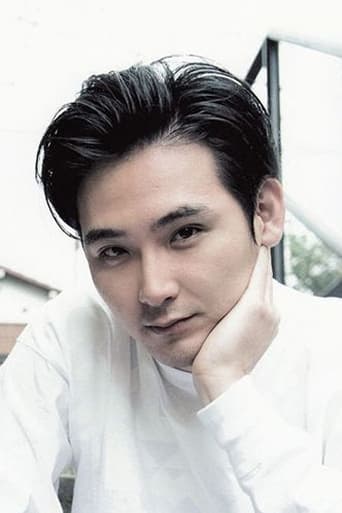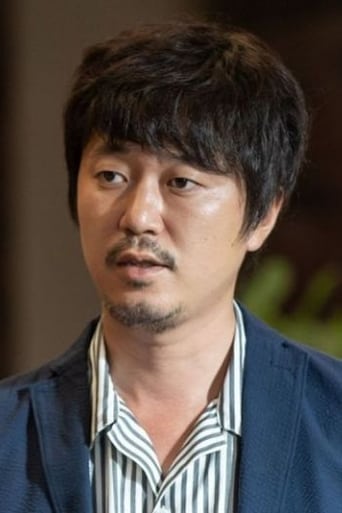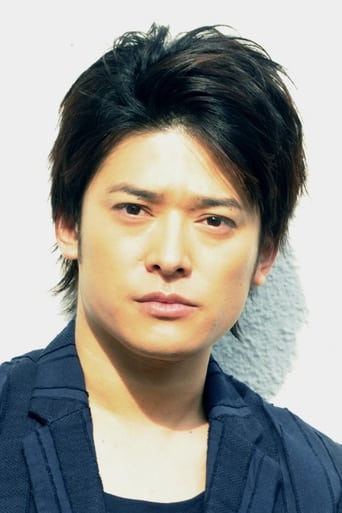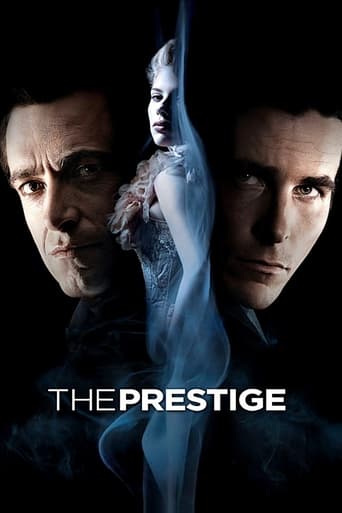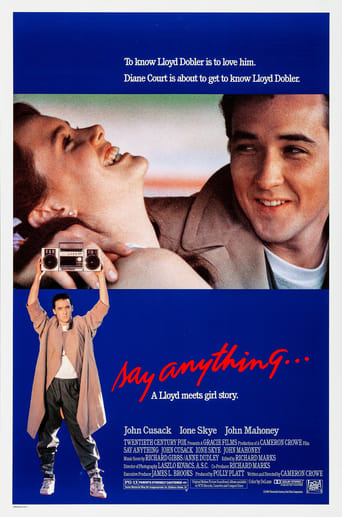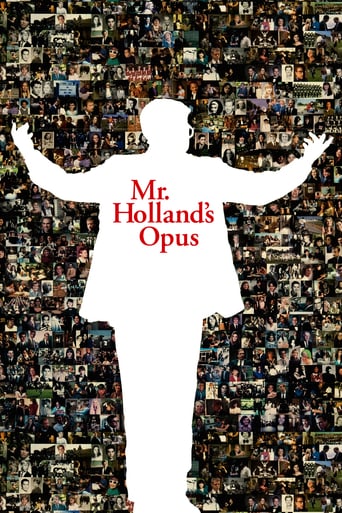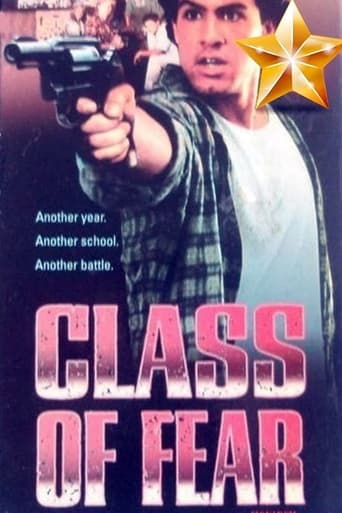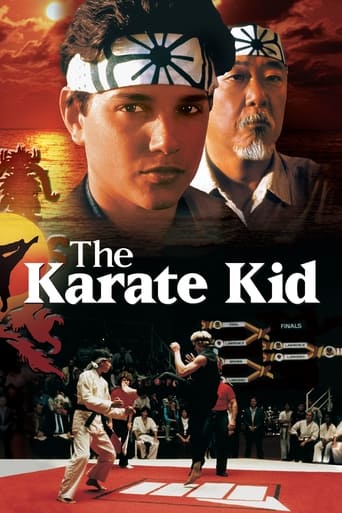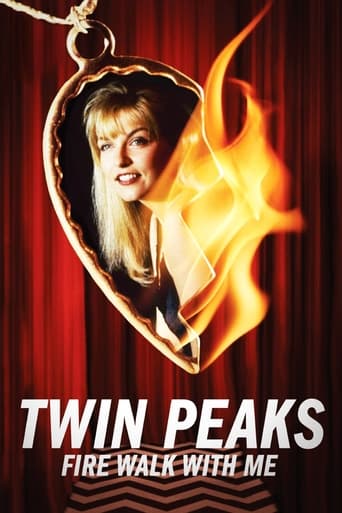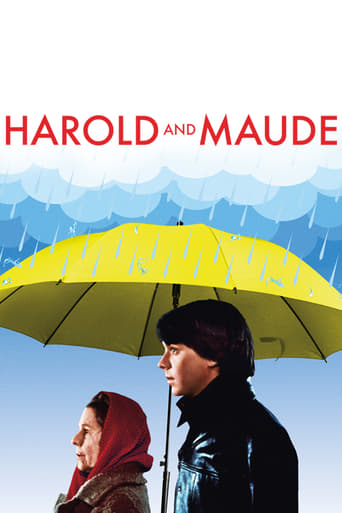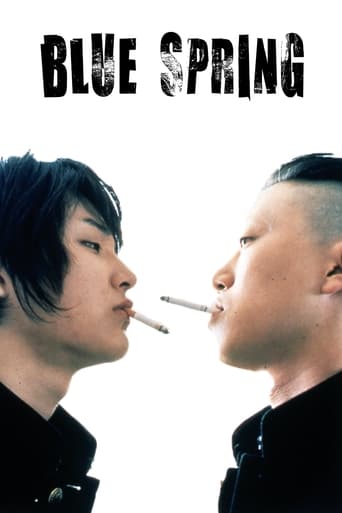
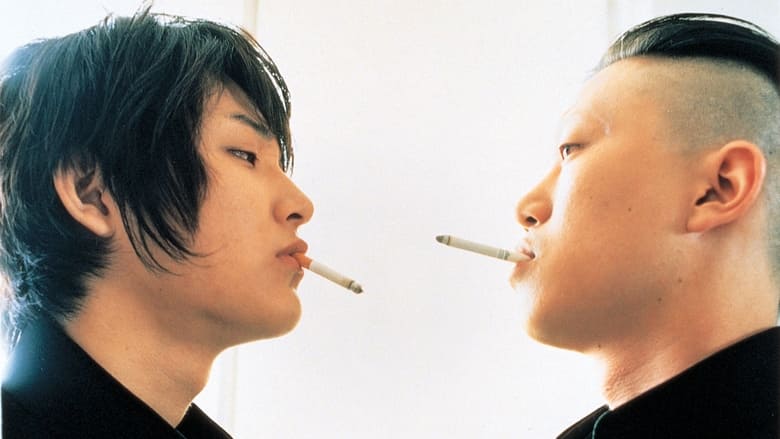
Blue Spring (2001)
Soon after being named the new leader of his high school's gang system, Kujo grows bored with the violence and hatred that surround him. He wants desperately to abandon his post… but his once-enviable position of power has a strange way of making him feel powerless.
Watch Trailer
Cast


Similar titles
Reviews
so i decided to get around to watching this after seeing a pretty screencap from the film and googling it, reading a synopsis that sounded interesting and finding out that it had a cult following among both western and Japanese fans. i've viewed the film and *gasp* dear god my opinion is blasphemous--i really wasn't a fan. I was surprised to only see one other negative user review thinking it was my fault but nah not really. FIRST, i enjoyed the cinematography, acting and score. the j-alt/punk rock soundtrack was amazing utilized, not a lot of diversity but it was as rattly and raw as what was unfolding on the screen so props for that. the acting was also nothing crazy but the nihilistic tones of the film were conveyed very well with sincere acting that depicted withdrawn yet oddly human characters. the imagery and overall cinematography was quite beautiful, and visually it was pleasant to watch; special mention to the sakura porn that popped up every once in a while because those were especially beautiful but thats just my inner weeb talking. BUT i really wasn't a fan of the actual characters and plot. i thought they were icy--and i'm not talking reserved icy--i mean detached, disconnected and barely relatable. so as the events were unfolding throughout the film, i didn't really care to keep up with the people at the centre of the conflicts. i also didn't like the plot as it was vague with seemingly random events at times. i've seen other reviews defending the film saying its a fascinating take on disillusioned teenage Japanese boys a-la battle royale and how they struggle to find their meaning as adults blah blah blah. i'm not going to argue against that, i've just seen similar ground covered in related works that make this film look weak and barely pointed. if anyone's seen suicide club, i think that touched on similar themes but really drove the meaning home. in terms of trying to find one's place, NANA & a bunch of other manga series make a much greater effort and execute their message effectively. i didn't see that in this film, and a bit of metaphor and musing from characters for 5 minutes max definitely doesn't interest me towards the whole coming-of-age story its trying to push. maybe i don't get it, maybe if i was Japanese it would make more sense but i've enjoyed works in a similar vein and found little to love with blue spring (aoi haru)
If one pays scant attention to the news in Japan, seen Iwai Shunji's _All About Lily Chou Chou_, or read short stories and novels by Murakami Ryu, one knows that Japan, like other countries, suffers from an escalation of violence in schools. This violence works in three ways: student vs. teacher, teacher vs. student, and, the most common, student vs. student. Although it is still rare, the newspapers and news programs are peppered with stories of bullies beating someone to death or the bullied killing his bullies. Murakami Ryu and Yu Miri have both focused on these subjects in their literary works. Toyoda Toshiaki, through his film _Blue Spring_ also touches on this controversial subject.The kids attending the all boys Asahi High School would basically be considered the dregs of Japanese society. The school is rundown and the teachers teach such a drypan, apathetic manner that it is not surprising that the kids could care less. The only teacher who seems to actually care about any of his students is a dwarf who waters the flowers on the school grounds all day.However, although the teaching might be unstructured, there is a rigid code of hierarchy enforced by the tough kids. A leader is chosen by a suicidal ritual in which a student claps his hands as many times as possible while falling backwards. After he claps a certain amount of times, he grabs the guardrail. Miss the guardrail, instant pancake.At the beginning of this film, after the "graduation" of the senior class, Kujo, played by the extraordinarily handsome Matsuda Ryuhei, wins the contest. Kujo is a bit indifferent to his new found power, but goes along with it because he has the support of his friends: Aoki, Yukio, Yoshimura, and Kimura. Although many of the students are not satisfied with the way their lives are shaping, they seem to basically concede that good jobs and college are not in their future and that they are either on the track to become either a menial laborer or a member of the Yakuza._Blue Spring_ is an interesting film that depicts individuals who are not on the "normal road of becoming a good Japanese citizen": i.e. Graduation, work, stable family. It shows the dregs, but the dregs also show that social hierarchy exists from the lowest to the highest.I think that the film is quite well done. The filming is dark, but it fits the atmosphere of the film. The soundtrack is excellent.
I read a review of "Blue Spring" on a movie festival page, and thought it sounded interesting at the very least. I purchased it blindly, hoping it would live up to some of the rave reviews it received. Not only did it live up to it's billing, it replaced Takeshi Kitano's "Fireworks (Hana-bi)" as my all-time favorite movie.From the opening scene we get the feeling that this is not your normal highschool and these are not your normal students. However, the students face problems that are extremely similar to the problems we have all had. However, we come to realize that the setting and the characters are not that different and that the story is in fact believable. This above all else is the reason why "Blue Spring" touched me so much.The main character Kujo wins a game of "Clapping" and becames the boss of a gang at an all-boy high school. The idea of the game is to clap as many times hanging from a roof-top fence without falling to your death. At first he finds his role mildly amusing as he deals out punishment to anyone who disrespects him or his best friend Aoki. Eventually, as with everything, he grows tired of his role and begins to lose his control of the school.Aoki is dependent on Kujo. He needs Kujo to tell him what to do, how to act. But when Kujo alienates Aoki, it sends him into a tail-spin of destruction.The other members of the gang hit were very easy to identify with. One member devoted his entire childhood to chasing the dream of taking the baseball team to Nationals. However, when he blows their chance on the final pitch of a game, he can't get past it and is unable to move on with his life. What makes this even more difficult for us to watch is the fact that he is a tutor of sorts to a freshman student who is beginning to take the game too far and is seemingly destined to live out the same fate. Another student has no absolutely no direction. No clue as to what he wants to do. As the time for him to decide begins to run out the pressure becomes to much for him and he commits an unbelievable act. Perhaps my favorite character in the entire film.Other kids include many who are controlled by the whims of the leaders, some who genuinely want to get out of there and go to school and one who is cruely called "Ghost" (even by teachers) because he has a terminal illness.The direction is simply amazing. Toshiaki Toyoda always manages to find the right angle. Some scenes are absolutely beautiful. One example is when a character waits on the rooftop after school lets out and the camera fast-forwards through the entire night and into the morning as he waits for the next day to begin. Another is when Ghost is seen running away from school, as other students contemplate his motivation. Yet another example is one student's penchant for coloring things black and there is a quick shot of him standing atop the school, which has been seemingly been painted black over night, only to have a another cut back to reality shows the school is still white leaving the viewer thinking "Did I just see that?" Dramatic moments are intercut with shots of the beautiful cherry trees that border the school (one character takes care of them with extreme devotion), blooming flowers, clouded skylines ect. Even in moments of extreme violence or desperation we are never allowed to forget that this is a beautiful film. The soundtrack is simply one the best I've ever heard. The Japanese punk-rock fits in perfectly as it pounds our ears during slow-motion shots and equally well with chases through the school and acts of violence. The ending of the film is unforgettable. It's one of those endings that - when the credits roll - you're just left staring and wishing it didn't end, but you know it couldn't have ended any other way. I've never given a film a 10/10 before but I whole-heartedly believe this film deserves it. It's not particularly easy to watch but it's undeniably moving and powerful.
The closing night movie for the SF Indie Fest is a vaguely coming of age type drama, set entirely within the grounds of a Japanese boy's school. Here, the kids all run around in gangs, sleep in lectures and fight at break times. Every wall in the place is covered in graffiti. Ryuhei Matsuda (the effeminate guy from GOHATTO) stars as Kuja, a senior who becomes the school's official gang leader by winning at "The Clapping Game". This game involves the kids hanging from a railing on the edge of the school roof, letting go and seeing how many times they can clap their hands before their nerve fails and they grab back on.From here we follow the progress of his friends and enemies throughout a part of the school year, the challenges to his leadership and the pressure of the school system felt by everyone. There's a hell of a lot of violence goes on in the school, and we get the impression that life as a Japanese school boy is a difficult dangerous business.It's a pretty bleak and cheerless vision - between this and BATTLE ROYALE you'd be forgiven for thinking that the Japanese school system was on the point of explosion or collapse, with the youth as disaffected as they come. How close this is to reality I don't know, but the friend I saw it with tells me that the classroom scenes are pretty close to how it actually is.The cast all perform well - Ryuhei Matsuda has such a striking appearance that he doesn't really need to do anything to create an impression, and indeed he spends most of the movie being aloof and impenetrable. This contrasts with the energies and frustrations evident in the other characters, particulary his best friend Aoki.I enjoyed the movie a lot... good characters, and well filmed/scored, with interesting developments. It's based on a collection of autobiographical short stories from a manga artist, which shows a little bit in the episodic nature of the plot, but it's all weaved together well for the movie. Worth looking out for if you don't mind your high school movies nihilistic, violent and bleak.


